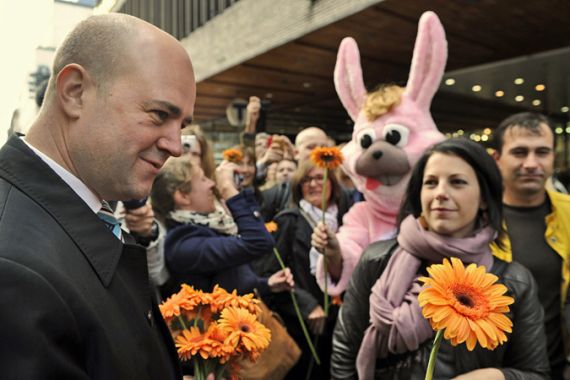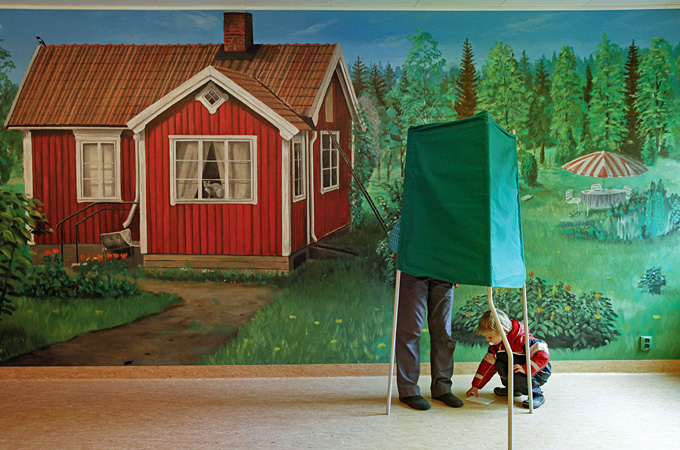Final push in Swedish elections
Opinion polls suggest narrow lead for ruling centre-right while far-right party may enter parliament for the first time.

 |
| The ruling bloc could become the first right-wing government to win a second term in nearly a century [AFP] |
Swedish party leaders are making final efforts to win votes on election day as opinion polls suggest a tight race between the rival blocs.
Sunday’s polls may also see the far-right making its debut in the parliament. In theory, the nationalist Sweden Democrats (SD) could even get a role as “kingmaker.”
But both blocs have pledged not to seek support from SD to form a majority, saying the group represents xenophobic views that run counter to Sweden’s tradition of tolerance.
The leaders for the four parties in the ruling centre-right coalition were walking down Stockholm’s main shopping street on election day, distributing flowers in their trademark orange colour and talking to voters.
Meanwhile, Mona Sahlin, heading the Social Democratic party and seeking to become Sweden’s first-ever female prime minister, visited a Gothenburg suburb well-known for its high percentage of immigrants.
The ruling bloc had a strong lead in opposition polls until last week. The gap has since been narrowing and in a major poll a day before the elections, the centre-right was forecast to garner 49.9 per cent of the vote compared to the opposition’s 45.3 per cent.
Undecided voters
But with more than half a million of 7.1 million eligible voters believed to make up their minds only on election day, analysts said the result was a toss-up.
“It’s very exciting and uncertain. I don’t want to assume anything,” K-G Bergstrom, a veteran political commentator for Swedish Television, told Al Jazeera.
|
He said debate over the health insurance in the last week had resulted in apparent losses in support for the centre-right.
Since the centre-right won polls in 2006 and ended 12 years of Social Democrats minority governments, it has lowered taxes for working Swedes and reformed the welfare benefits system.
Especially stricter rules in the health insurance have been widely criticised. A group of cancer doctors entered the debate in December, saying patients with deadly diagnoses and pain were forced to work.
However, Bergstrom said many Swedish voters tend to think that the government proved competent in handling the financial crisis and that voters’ confidence in Fredrik Reinfeldt, the prime minister and leader of the Moderate Party, is larger than that for the Social Democrats leader.
For the first time, the opposition – Social Democrats, the Left Party and the Green Party – have gathered in an alliance ahead of this year’s polls to challenge the ruling bloc.
“Right-wing governments are many in Europe today and they are fairly strong,” Sahlin told Al Jazeera.
“To try to challenge them, progressive parties have to join together as we have tried now in Sweden.”
If Reinfeldt’s centre-right wins the election, it will become the first right-wing government to be re-elected in nearly a century.
Far-right gains
The apparent rise of the far-right Sweden Democrats has been given a lot of attention in the run-up to the election. Both Sahlin and Reinfeldt have stressed the importance of achieving a majority government to prevent the Sweden Democrats from getting any influence on the balance of power.
“Don’t expose Sweden to this experiment [of allowing the Sweden Democrats into parliament]. Make sure they don’t get any power,” Reinfeldt said on Saturday, urging Swedes to vote in “a stable majority government.”
The ruling coalition has vowed to negotiate with the Green Party if it fails to win an outright majority, to avoid being dependent on support from SD. Meanwhile, the opposition has said that if it becomes the strongest bloc, it will seek to win over one of the smaller parties from the centre-right.
The Sweden Democrats campaign has been based on warnings of the Muslims’ “growing influence” in the country. Kent Ekeroth, SD’s international secretary, has said ethnic Swedes could become “second class citizens.”
The party says immigration is draining the welfare system. It wants to cut asylum and immigration by relatives of people already living in Sweden by 90 per cent.
Immigrants make up 14 per cent of the country’s population of 9.4 million, with the biggest group from neighbouring Finland followed by Iraq, the former Yugoslavia and Poland.
Polling stations will be closing at 8:00 pm local time (18:00 GMT). The outcome of Swedish polls is normally revealed within few hours, but this year, a record two million advance votes could delay final results, as some of those ballots may not be counted until Wednesday.
Voter turnout in Sweden is traditionally high and stood at nearly 82 per cent in the last elections.